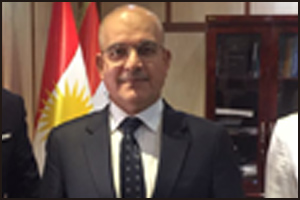
The Kurdistan Region of Iraq has been facing security challenges for the past two years. However, in his speech, the last 1st of May, Prime Minister Barzani said that the Region has embarked on a new era, the post-ISIS era. How do you think this new era will transform the Kurdistan Region?
Kurdistan has proved to be a safe and stable region; it is something that the international community has witnessed during the last three years. In addition, the government is implementing reforms and laws to facilitate investment and business, including some projects to boost the financial sector in which the World Bank is involved. Thanks to the stability of the Kurdistan Region, the international companies that left with the crisis are coming back now, especially in the oil and gas industry, and they are confident in the region as a business destination.
The recent liberation of Mosul seems the end of the Peshmerga operations in the wider region, which ensures an effective communication with a key area of Iraq, what are the implications of the liberation?
The liberation of Mosul means that people and companies start working on recovering a normal life. Kurdistan is a relatively big market of five million inhabitants, and it is the gateway to the Mosul region, one of the most important territories in Iraq with around four million people. The liberation means that the companies now have a great market to operate with plenty of economic needs, especially from the infrastructure point of view, and the government is determined to work in the reconstruction.
Efficient transport infrastructures are a must to attract international enterprises to Kurdistan. What are the main advantages that investors can find here compared to other regions in the Middle East?
The international investors can find in Kurdistan plenty of business opportunities that you cannot see in any neighboring country. We are a friendly-business nation with a government that is emplacing the best legislation to facilitate investment and makes procedures as easy as possible for international enterprises. Obviously, in terms of security and stability we are way ahead of other countries in the Middle East, a key factor, probably the most important one, to guarantee the foreign investment.
There are three main actors that control the telecommunications market in Kurdistan; Asiacell and Korek are the two main mobile operators and Newroz Telecom is the sole high-speed internet provider. What are the opportunities that the foreign investor can find in the Kurdish telecommunication industry?
Innovation is driving the sector and we are always looking forward to developing new technologies in the telecommunications industry. The best investment opportunities are linked to technological innovation. For example, we are now working with several investment contractors to provide fiber-optic services in every area of Kurdistan.
We do have international leading companies in this industry; Faruk Group is one of the best internet providers in the world and offers fiber-optic services in all the Sulemani province, and Newroz Telecom, in partnership with this Ministry, provides high-speed services all over the country, especially in Erbil and Duhok. Even though, with projects like the previously described, we expect investors to come and take part in the development of the market.
Kurdistan is an interesting market for internet providers, we the population has a huge demand for these services and a number of users is permanently growing. In addition, due to its size, it is a territory that can be easily connected, especially compared to neighbors like Iran or Turkey. The technologies are changing really quickly and, being innovation a driving factor of our policy, we keep the track of the international developments in several countries, including China or France.